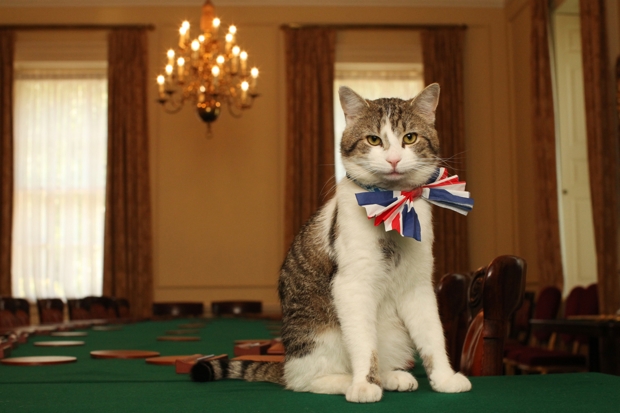One important staffing decision David Cameron took early in his premiership was to fill the post of Chief Mouser, which had been vacant since the demise of its previous occupant, Sybil, at the height of the global financial crisis. Defying their party’s commitment to lean government, the Conservatives made two appointments: Larry and Freya. These cats are the latest in a long line of Downing Street felines, stretching back at least to Churchill’s time in office. Incumbents often hold the role for a long time: Mrs Thatcher’s cat, Humphrey (allegedly named after a fictional civil servant with similar feline cunning), remained in office through the rest of her term, and that of her successor John Major, finally retiring from service in 10 Downing Street during Tony Blair’s first term in office.
Like all Whitehall civil servants, the Downing Street cats are resolutely apolitical, serving at the pleasure of Her Majesty’s government, whichever political tribe takes the helm. But this is not how they are seen by the electorate. In an experiment run with the survey company YouGov, a representative sample of voters were shown a picture of the redoubtable Humphrey randomly varying whether he was described as Margaret Thatcher’s cat or Tony Blair’s cat and asked to say whether they liked or disliked him. The figure below shows how the net approval of Humphrey the cat (the share who like Humphrey minus the share who dislike him) varies depending on the partisanship of the respondents doing the rating, and the Prime Minister with whom Humphrey is associated.

Humphrey comes out with a strongly positive net rating (unlike most of the politicians he served) and his overall rating among all voters is not much affected by association with Thatcher or Blair. The views of partisan respondents, however, are strongly affected by Humphrey’s perceived owner. Conservative voters show a much stronger affection for Mrs Thatcher’s cat than for an identical cat associated with Mr Blair, while Labour partisans show the opposite preference. The same was true in a second experiment using pictures of the (different) cats resident in Downing Street during Gordon Brown and David Cameron’s terms in office. Labour identifiers gave a cat associated with Gordon Brown a net rating of +50, but the same cat scored just +37 with Conservative partisans. Larry, Cameron’s cat, scored +52 with Conservative identifiers but +40 with Labour loyalists. Nor is partisanship the only political attachment to influence views of the Chief Mouser: ideological values, views about national identity, gender and age are all associated with views of Humphrey and his successors, and these effects vary depending on the perceived owner. The public, it seems, buy into the theory that pets resemble their owners, but apply it to political outlook as well as appearance or personality.
The tale of Humphrey’s politics illustrates a more serious point: our own political attachments and values tend to colour our views of anything and everything we associate with politics. Similar experiments conducted in the United States have shown that racially prejudiced Americans dislike Barack Obama’s dog, which doesn’t sound so harmful, but they also dislike any and every policy associated with Barack Obama, which certainly is. Racially intolerant Americans approved of Obama’s reforms to expand access to health care for the young and the poor, but disapproved of identical reforms when they were associated with the President. One American late-night comedian confronted voters with this inconsistency, and found that many simply refused to believe that the health care reforms they supported were the same thing as the ‘Obamacare’ they rejected.
Attaching policies to politicians can thus short circuit entirely any rational consideration of their costs and benefits, replacing them with ideological and tribal loyalties. British researchers have found similar effects: voters interviewed around the time of the 1997 election tended to support policies associated with Tony Blair and Labour, but reject identical policies when they were attributed to John Major and the Conservatives, a phenomenon known as the ‘halo and forked tail effect’. Partisanship also skews how voters judge responsibility: partisans are eager to give their preferred party credit for successes, and to absolve them from blame for failures.
In an idealised democracy, voters will assess the merits of policies and politicians, and then choose between them. In reality, voters often do the opposite: attached to one political tribe, their views of policies, politicians (and pets) are driven by whether these are seen as on our team or their team.
This is an extract from Sex, Lies & the Ballot Box: 50 things you need to know about British elections, by Philip Cowley and Robert Ford






Comments